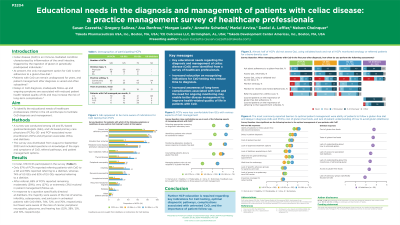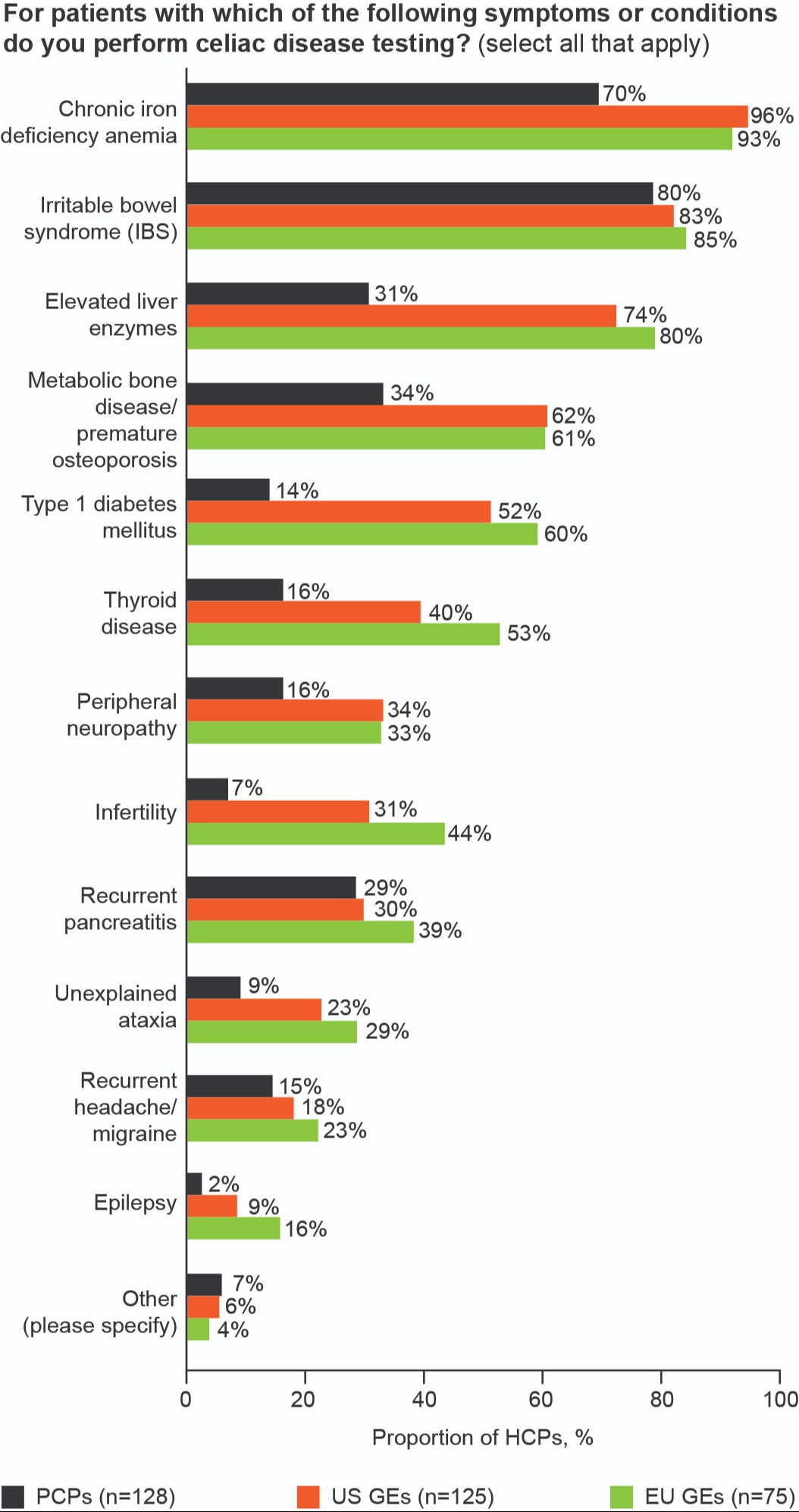Monday Poster Session
Category: Small Intestine
P3204 - Educational Needs in the Diagnosis and Management of Patients With Celiac Disease: A Practice Management Survey of Healthcare Professionals
Monday, October 28, 2024
10:30 AM - 4:00 PM ET
Location: Exhibit Hall E

Has Audio

Susan Cazzetta, PharmD
Takeda Pharmaceuticals USA, Inc.
Cambridge, MA
Presenting Author(s)
Susan Cazzetta, PharmD1, Gregory Salinas, PhD2, Asa Renfroe, MPH, BSc2, Morgan Leafe, MD2, Annette Schwind, MS1, Mariel Arvizu, MD3, Daniel A.. Leffler, MD, PhD3, Nelson Cheinquer, MD3
1Takeda Pharmaceuticals USA, Inc., Boston, MA; 2CE Outcomes LLC, Birmingham, AL; 3Takeda Development Center Americas, Inc., Boston, MA
Introduction: Diagnosis of celiac disease (CeD) can be slow and patient management after diagnosis is varied and often suboptimal. In this study, we aimed to identify the educational needs of healthcare professionals (HCPs) in the US and Europe to facilitate CeD diagnosis and management.
Methods: A survey was conducted among gastroenterologists (GEs), primary care physicians (PCPs), GE-and PCP-associated nurse practitioners (NPs) and physician associates (PAs), and dietitians. The survey was distributed from August to September 2023 and included questions on knowledge of signs and symptoms of CeD, referral pathways, and patient management.
Results: In total, 378 HCPs participated (US PCPs, n = 128; US GEs, n = 125; EU GEs, n = 75; US dietitians, n = 50; Table 1). Chronic iron deficiency anemia was the most commonly recognized indication for CeD testing, and GEs were substantially more aware than PCPs of possible CeD symptoms (Figure 1). Only 67% of PCPs reported referring patients with CeD to a GE and 59% reported referrals to a dietitian, whereas 74% of US GEs and 62% of EU GEs reported referring to a dietitian. After referral, 69% of PCPs reported remaining moderately/very/extremely involved in patient management/follow-up; however, PCPs were less comfortable with various aspects of CeD management than GEs. The majority of dietitians were aware of the risk of anemia, infertility, osteoporosis, and joint pain in untreated CeD (94%, 74%, 72%, and 70% of dietitians, respectively), but fewer were aware of the risks of cancer, peripheral neuropathy, glaucoma, and hearing loss (52%, 38%, 12%, and 10%, respectively). While the majority of HCPs ( >90% of PCPs and GEs, 86% of dietitians) assessed patient quality of life (QoL) informally in the first year after diagnosis, only 52–55% reported using validated QoL tools. During follow-up, 22% and 15% of PCPs reported not referring patients for serology testing or bone density scans, respectively. The most commonly reported barriers to optimal patient management among PCPs and GEs were ability to follow a gluten-free diet (GFD), delays in diagnosis, and cost of a GFD. Among dietitians, the most commonly reported barriers were cost and taste of gluten-free foods, and lack of understanding of how to eliminate gluten.
Discussion: Further HCP education is required regarding key indications for CeD testing, optimal diagnostic pathways, complications associated with untreated CeD, and importance of patient follow-up.

Note: The table for this abstract can be viewed in the ePoster Gallery section of the ACG 2024 ePoster Site or in The American Journal of Gastroenterology's abstract supplement issue, both of which will be available starting October 27, 2024.
Disclosures:
Susan Cazzetta, PharmD1, Gregory Salinas, PhD2, Asa Renfroe, MPH, BSc2, Morgan Leafe, MD2, Annette Schwind, MS1, Mariel Arvizu, MD3, Daniel A.. Leffler, MD, PhD3, Nelson Cheinquer, MD3. P3204 - Educational Needs in the Diagnosis and Management of Patients With Celiac Disease: A Practice Management Survey of Healthcare Professionals, ACG 2024 Annual Scientific Meeting Abstracts. Philadelphia, PA: American College of Gastroenterology.
1Takeda Pharmaceuticals USA, Inc., Boston, MA; 2CE Outcomes LLC, Birmingham, AL; 3Takeda Development Center Americas, Inc., Boston, MA
Introduction: Diagnosis of celiac disease (CeD) can be slow and patient management after diagnosis is varied and often suboptimal. In this study, we aimed to identify the educational needs of healthcare professionals (HCPs) in the US and Europe to facilitate CeD diagnosis and management.
Methods: A survey was conducted among gastroenterologists (GEs), primary care physicians (PCPs), GE-and PCP-associated nurse practitioners (NPs) and physician associates (PAs), and dietitians. The survey was distributed from August to September 2023 and included questions on knowledge of signs and symptoms of CeD, referral pathways, and patient management.
Results: In total, 378 HCPs participated (US PCPs, n = 128; US GEs, n = 125; EU GEs, n = 75; US dietitians, n = 50; Table 1). Chronic iron deficiency anemia was the most commonly recognized indication for CeD testing, and GEs were substantially more aware than PCPs of possible CeD symptoms (Figure 1). Only 67% of PCPs reported referring patients with CeD to a GE and 59% reported referrals to a dietitian, whereas 74% of US GEs and 62% of EU GEs reported referring to a dietitian. After referral, 69% of PCPs reported remaining moderately/very/extremely involved in patient management/follow-up; however, PCPs were less comfortable with various aspects of CeD management than GEs. The majority of dietitians were aware of the risk of anemia, infertility, osteoporosis, and joint pain in untreated CeD (94%, 74%, 72%, and 70% of dietitians, respectively), but fewer were aware of the risks of cancer, peripheral neuropathy, glaucoma, and hearing loss (52%, 38%, 12%, and 10%, respectively). While the majority of HCPs ( >90% of PCPs and GEs, 86% of dietitians) assessed patient quality of life (QoL) informally in the first year after diagnosis, only 52–55% reported using validated QoL tools. During follow-up, 22% and 15% of PCPs reported not referring patients for serology testing or bone density scans, respectively. The most commonly reported barriers to optimal patient management among PCPs and GEs were ability to follow a gluten-free diet (GFD), delays in diagnosis, and cost of a GFD. Among dietitians, the most commonly reported barriers were cost and taste of gluten-free foods, and lack of understanding of how to eliminate gluten.
Discussion: Further HCP education is required regarding key indications for CeD testing, optimal diagnostic pathways, complications associated with untreated CeD, and importance of patient follow-up.

Figure: Figure 1. Indications for celiac disease testing recognized by PCPs and GEs.
GE, gastroenterologist; HCP, healthcare professional; PCP, primary care physician.
GE, gastroenterologist; HCP, healthcare professional; PCP, primary care physician.
Note: The table for this abstract can be viewed in the ePoster Gallery section of the ACG 2024 ePoster Site or in The American Journal of Gastroenterology's abstract supplement issue, both of which will be available starting October 27, 2024.
Disclosures:
Susan Cazzetta: Takeda Pharmaceuticals – Employee, Stock Options, Stock-publicly held company(excluding mutual/index funds).
Gregory Salinas: Takeda Pharmaceuticals – Independent Contractor.
Asa Renfroe: Takeda Pharmaceuticals – Independent Contractor.
Morgan Leafe: Takeda Pharmaceuticals – Independent Contractor.
Annette Schwind: Takeda Pharmaceuticals – Employee, Stock Options, Stock-publicly held company(excluding mutual/index funds).
Mariel Arvizu: Takeda Pharmaceuticals – Employee, Stock Options, Stock-publicly held company(excluding mutual/index funds).
Daniel Leffler: Takeda Pharmaceuticals – Employee, Stock Options, Stock-publicly held company(excluding mutual/index funds).
Nelson Cheinquer: Takeda Pharmaceuticals – Employee, Stock Options, Stock-publicly held company(excluding mutual/index funds).
Susan Cazzetta, PharmD1, Gregory Salinas, PhD2, Asa Renfroe, MPH, BSc2, Morgan Leafe, MD2, Annette Schwind, MS1, Mariel Arvizu, MD3, Daniel A.. Leffler, MD, PhD3, Nelson Cheinquer, MD3. P3204 - Educational Needs in the Diagnosis and Management of Patients With Celiac Disease: A Practice Management Survey of Healthcare Professionals, ACG 2024 Annual Scientific Meeting Abstracts. Philadelphia, PA: American College of Gastroenterology.
